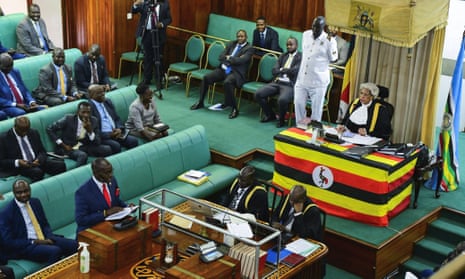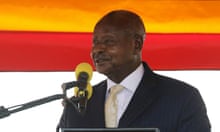Uganda’s parliament has passed a mostly unchanged version of one of the world’s strictest anti-LGBTQ+ bills after President Yoweri Museveni asked that certain provisions from the original legislation be toned down.
Despite four amendments, the bill retains most of the harshest measures of the legislation adopted in March. Those include the death penalty for certain same-sex acts and a 20-year sentence for “promoting” homosexuality, which activists say could criminalise any advocacy for the rights of lesbian, gay, bisexual, transgender and queer citizens.
A measure that obliged people to report homosexual activity was amended to only require reporting when a child is involved. Failure to do so is subject to five years in jail or a fine of 10 million Ugandan shillings (£2,150).
Anyone who “knowingly allow[s] their premises to be used for acts of homosexuality” faces seven years in jail.
Museveni returned the bill to parliament last month, asking lawmakers to remove the duty to report and to introduce a provision to facilitate the “rehabilitation” of gay people. No such provision has been included in the amended bill.
Museveni, a vocal opponent of LGBTQ+ rights, applauded lawmakers for having “rejected the pressure from the imperialists”.
The US, European Union and major corporations have condemned the bill, and the US government said it was assessing the implications of the looming law for activities in Uganda under its flagship HIV/Aids programme. The UN human rights head, Volker Türk, called the proposed law “shocking and discriminatory”.
Last month, a group of leading scientists and academics from Africa and across the world urged Museveni to veto the bill, saying that “homosexuality is a normal and natural variation of human sexuality”.
Today, 371 MPs voted for the amended bill. One MP from the ruling party, Fox Odoi-Oywelowo, voted against, saying it contravened the constitution. The presence of 170 MPs is required to vote on a bill.
Museveni has 30 days to either sign the legislation into law, return it to parliament for another revision, or veto it and inform the parliamentary speaker. The bill will, however, pass into law without the president’s assent if he returns it to parliament for a second time.
Anita Among, the speaker of parliament, said: “Today, parliament has gone again into the history books of Uganda, Africa and the world, [because it] clearly brought up the issue of homosexuality, the moral question, the future of our children, and protecting families.”
She asked MPs to “remain steadfast” in their commitments, adding that “no amount of intimidation will make us retract from what we have done. Let’s stand firm.”
An earlier anti-gay bill in 2014 also prompted widespread international criticism and was later nullified by Uganda’s constitutional court on procedural grounds.
Clare Byarugaba, an LGBTQ+ advocate in Kampala, suggested the latest bill could have the same fate. “The anti-gay bill is dangerous, regressive and full of hate, and will be thrown out on its day in court,” she tweeted. “It doesn’t belong in Uganda’s history books.”
The Ugandan writer and feminist Rosebell Kagumire warned in a tweet that the law could deny queer Ugandan’s housing, education and “other fundamental rights” and could be used “by your enemies, and government included … against anyone”.
Flavia Mwangovya, Amnesty International’s deputy regional director said: “The Ugandan president must immediately veto this law and take steps to protect the human rights of all individuals, regardless of their sexual orientation or gender identity. Amnesty International also calls on the international community to urgently put pressure on the Ugandan government to protect the rights of LGBTI individuals in the country.”








